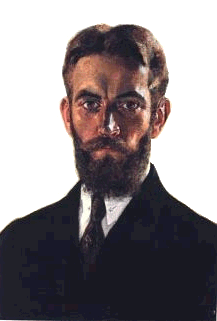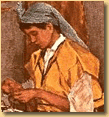|


|
Alexander
Roubtzoff was evidently an orientalist, but in the best possible
way: that in which his profound respect and humility merged in
order to give birth to deeply human works.
“Save the Orient’s old traditions from oblivion, those that are really beautiful.”
Thus he wrote about his earnest yearning in one of the pages of his
journal, an ambition that perspires throughout his plentiful
production. Avoiding the traps of the superfluous or the mindless
following of the fashion of the time, Roubtzoff works reflect the
experience of a man moved by the sheer reality he faced at any given
moment. His need for merely witnessing the present never superseded the
emotions he felt, and that was his strength as a painter. |
|
|
|
 Nowadays,
the artist benefits from the renewed interest in orientalism that has been
contributing for several years now to put on the foreground many great artists
who remained in the shadows of others for too long. Nowadays,
the artist benefits from the renewed interest in orientalism that has been
contributing for several years now to put on the foreground many great artists
who remained in the shadows of others for too long.
"Is there in Tunis an artist more dedicated, more
prolific, more constantly bewitched by the desire to paint, than Alexandre
Roubtzoff ?
And more disinterested. His constant good mood,
his mysterious smile, his kindness and curtesy
had him conquer the heart of people
from all circles."
Alexandre Fichet, 1937
|
|
 But
isn't there something else we may admire, other than the orientalist part
of his work, him who was known as the painter of light and chromatic effects,
so acclaimed by critics ? But
isn't there something else we may admire, other than the orientalist part
of his work, him who was known as the painter of light and chromatic effects,
so acclaimed by critics ?
Indeed, his major, and probably best, pieces of work were made in North
Africa, but Paris or even Venice deserve some credit. There are other
reasons why we recently rediscovered his art. Art history cannot just
content itself with compiling a few famous names, especially when it has
to deal with such a rich period as the first half of the 20th century.

"Ninety percent of the artists are forgotten ten minutes after their
death."
This cannot be more false if applied to Roubtzoff. Only a few months after
his death, his works were displayed at the "Tunis Exhibit" of
1950, and also in 1951 and 1952. That year, an Alexandre Roubtzoff prize
is even instated. And in 1951, his friend Pierre Dumas wrote the first
book entirely dedicated to the artist. All this is a proof, if one was
needed, of his popularity and the mark he left among the other painters
in Tunisia. More than just his paintings, it is his touching personality
and his human qualities everybody seemed to praise.
Biography | Bibliography
| Art | Presence
| Links | News
© A.A.A.R. All rights
reserved.
|


 Nowadays,
the artist benefits from the renewed interest in orientalism that has been
contributing for several years now to put on the foreground many great artists
who remained in the shadows of others for too long.
Nowadays,
the artist benefits from the renewed interest in orientalism that has been
contributing for several years now to put on the foreground many great artists
who remained in the shadows of others for too long.